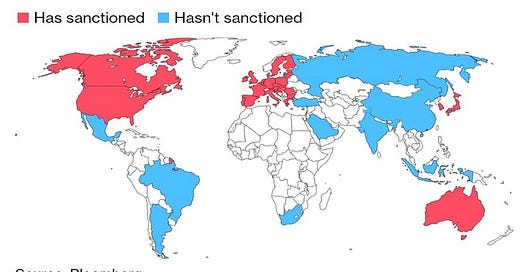Bloomberg Shouldn’t Be Shocked That Half Of The G20 Refuses To Sanction Russia
By each of these countries holding their own, they’ve collectively come to exert more influence over the global systemic transition to multipolarity than they ever could individually since the whole of their efforts have become greater than the sum of their parts. It’s this phenomenon that scares Bloomberg and other Western observers so much since they know at least in their subconsciousness that it spells the end of the US’ unipolar hegemony.
Bloomberg expressed shock in a recent article that “The US-Led Drive to Isolate Russia and China Is Falling Short”, but it shouldn’t have been taken off guard by this predictable development. It was always nothing but a political fantasy to imagine that the declining unipolar hegemon would successfully pressure rising Great Powers like the BRICS countries, Saudi Arabia, and Turkiye, et al., to comply with its anti-Russian sanctions. The reality is that the global systemic transition to multipolarity preceded the latest US-provoked phase of the Ukrainian Conflict but was nevertheless unprecedented accelerated by it, with International Relations now hurdling towards the unknown as the previously globalized order bifurcates along the systemic, ideological, and tactical axes as explained in the author’s earlier analysis.
It's not so much “economic imperatives…historic affinities to Moscow, concerns at signs of US disengagement and a distrust of former colonial powers that fuels a sense of hypocrisy” that are behind the failure of that declining unipolar hegemon’s anti-Russian “containment” strategy at the G20, but simply that those of its members from the Global South (including moderately wealthy Argentina and super wealthy Saudi Arabia that can be categorized as such for geographical-historical reasons) believe it to be in their objective national interests to practice a policy of principled neutrality in the New Cold War. Taking sides in any conflict would unilaterally reduce their strategic maneuverability and thus related autonomy during this ultra-dynamic period of history where they need maximum flexibility.
An objective assessment of the state of affairs on the eve of Russia’s special military operation in Ukraine that the US provoked would have easily revealed this insight, but the problem is that Western strategists and policymakers were blinded by their so-called “exceptionalist” ideology into dismissing the possibility of Global South countries refusing to bend to the Golden Billion’s demands. Simply put, they were so deluded by their unipolar political fantasies that they missed the multipolar processes that had been playing out on the world stage for at least the past decade, wrongly believing that any such talk about them was just so-called “Russian propaganda” and that their civilization’s dominance over International Relations would never end.
There’s now no doubt that the ideologically driven attempts at “containing” Russia have completely failed and thus humiliated these same influential Westerners. That’s why Mainstream Media (MSM) outlets like Bloomberg are scrambling for an explanation after it became impossible to deny this reality, though they can’t bring themselves to acknowledge the ideological basis for this grand strategic mistake, nor the independent agency of Global South states. Instead, speculation about “economic imperatives…historic affinities to Moscow, concerns at signs of US disengagement and a distrust of former colonial powers that fuels a sense of hypocrisy” reigns supreme, which risks replicating the same mistake through the creation o another alternative reality that’ll disastrously influence policymaking.
It doesn’t appear as though the US has any sincere desire to learn its lessons as evidenced by the continued pressure that it’s attempted to put upon India, which proudly boasts of being the world’s largest democracy and which Western experts wrongly predicted would mean that it’ll comply with their civilization’s demands to distance itself from Russia. The exact opposite has in fact happened: India doubled down on the Russian dimension of its multipolar grand strategy, even becoming its partner’s irreplaceable valve from Western pressure and thus preemptively averting its potentially disproportionate dependence on China, all the while condemning those that have sought to pressure it into unilaterally conceding on issues like Russia that it considers to be in its objective national interests.
India’s example proved that it’s possible to practice a policy of principled neutrality that carefully balances between the US-led Golden Billion and the BRICS-led Global South, which in turn inspired its multipolar G20 peers like Saudi Arabia and Turkiye to stay the course and not backtrack no matter how much pressure America attempts to put them under. By each of these countries holding their own, they’ve collectively come to exert more influence over the global systemic transition to multipolarity than they ever could individually since the whole of their efforts have become greater than the sum of their parts. It’s this phenomenon that scares Bloomberg and other Western observers so much since they know at least in their subconsciousness that it spells the end of the US’ unipolar hegemony.
To hammer home the point, it was purely through ideologically driven arrogance that the West ignored the preexisting multipolar processes in front of its influential figures’ eyes and thus wrongly predicted that they’d successfully coerce the Global South to jump on their anti-Russian sanctions bandwagon. Nothing of the sort was ever realistically possible since rising multipolar powers like the BRICS countries, Saudi Arabia, Turkiye, and others had already become strategically autonomous and were thus predisposed to practicing a policy of principled neutrality once the US pressured them into making a false zero-sum choice between the West and Russia. Apart from meddling, infowars, and regime change schemes, all of which could easily backfire, America lacks any real options for responding to this.




